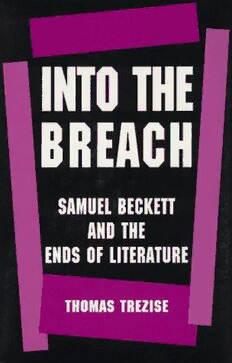
Into the breach : Samuel Beckett and the ends of literature PDF
Preview Into the breach : Samuel Beckett and the ends of literature
Into the Breach Into the Breach SAMUEL BECKETT AND THE ENDS OF LITERATURE Thomas Trezise PRINCETON UNIVERSITY PRESS PRINCETON, NEW JERSEY Copyright © 1990 by Princeton University Press Published by Princeton University Press, 41 William Street, Princeton, New Jersey 08540 In the United Kingdom: Princeton University Press, Oxford AU Rights Reserved Library of Congress Catalogmg-in-Publication Data Trezise, Thomas, 1953- Into the breach : Samuel Beckett and the ends of literature I Thomas Trezise. Includes index. 1. Beckett, Samuel, 1906— —Fictional works. 2. Beckett, Samuel, 1906- Molloy. 3. Beckett, Samuel, 1906- Malone meurt. 4. Beckett, Samuel, 1906- Innommable. I. Title. PQ2603.E378Z89 1990 843'.914—dc20 90-8557 ISBN 0-691-06789-9 (acid-free paper) Publication of this book has been aided by a grant from the Paul Mellon Fund of Princeton University Press This book has been composed in Linotron Baskerville Princeton University Press books are printed on acid-free paper and meet the guidelines for permanence and durability of the Committee on Production Guidelines for Book Longevity of the Council on Library Resources Printed in the United States of America by Princeton University Press, Princeton, New Jersey 3 5 79 10 8 6 42 For Susan and for my parents CONTENTS Preface ix INTRODUCTION The Breach 3 CHAPTER ONE Dispossession 34 CHAPTER TWO Impersonality 66 CHAPTER THREE Error 122 CONCLUSION The Ends of Literature 160 Index 171 PREFACE THE READING presented here focuses almost exclusively on Samuel Beckett's trilogy of novels and on the conception of subjectivity articulated therein. Its purpose is twofold: on the one hand, to place Beckett within a configuration of thinkers whose understanding of subjectivity remains incompatible with the totalizing claims of phenomenology, and on the other, to challenge in so doing the assumptions underlying virtually the entire corpus of Beckett criticism. Regarding this second objective, it is not my intention to conduct a sustained polemic against any particular critic or group of critics but rather, through a critique of its foun dation, to place in question the ideology that grew out of phenomenology in the forties and fifties and has since per vaded the interpretation of Beckett's work. I refer of course to existential humanism. There may well be no writer of this century who has more radically questioned the foundations of humanism than Samuel Beckett—and no writer who has spawned a corporation of critics more determined to ignore the consequences of that question ing. This determination frequently surfaces as the pro fessed belief that, in the end, Beckett restores human dig nity through his humor—as though the tenor of that humor were self-evident and not in the least subversive. Or else it is claimed, no less frequendy and unreflectively, that the ultimate horizon of a text supposedly centered on the despair of the human condition remains the redemp tive value of art itself. At any rate, the various ways in which Beckett's fundamentally critical work has been re cuperated all rely on an unexamined notion of the human subject. Indeed, this is why most of the criticism devoted to his work amounts to an exercise in ideology rather than in genuine reflection; and this is why one can only begin
